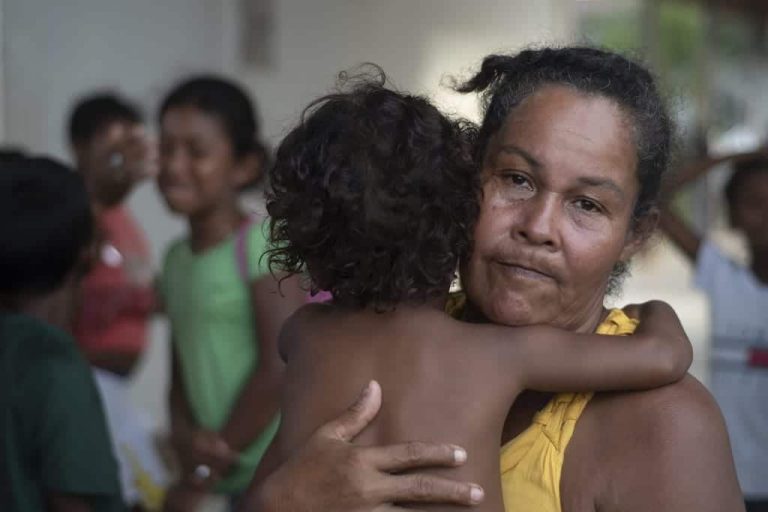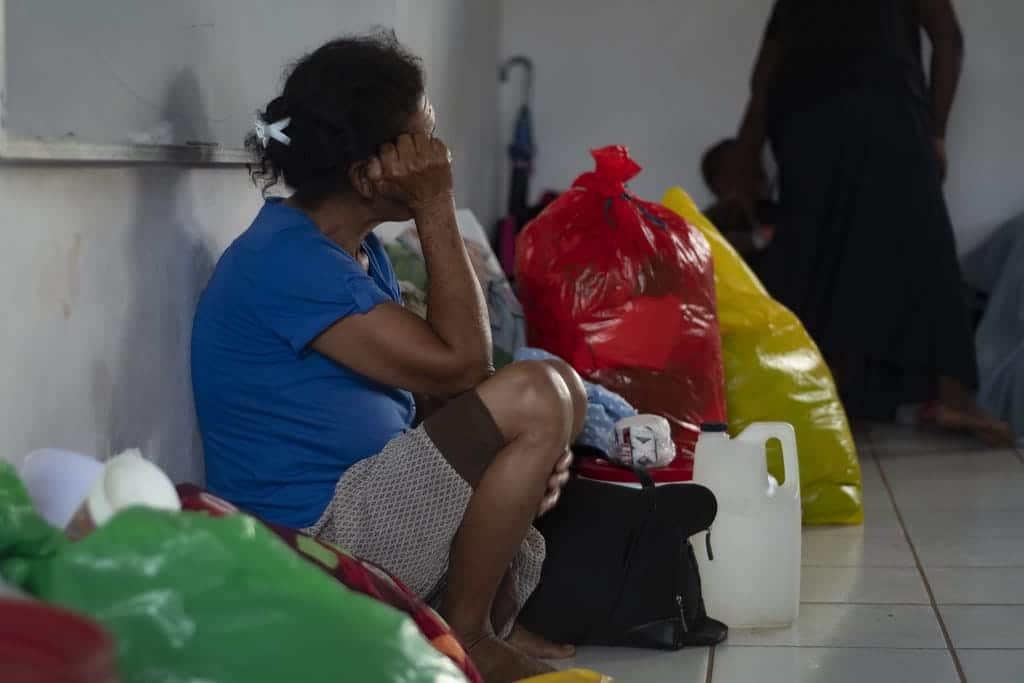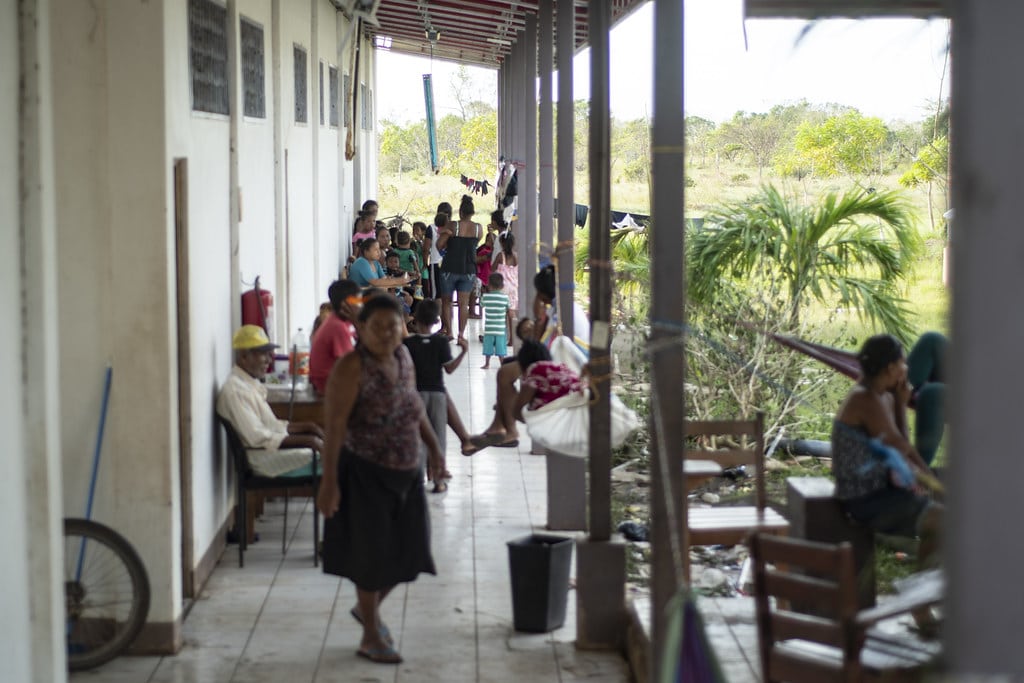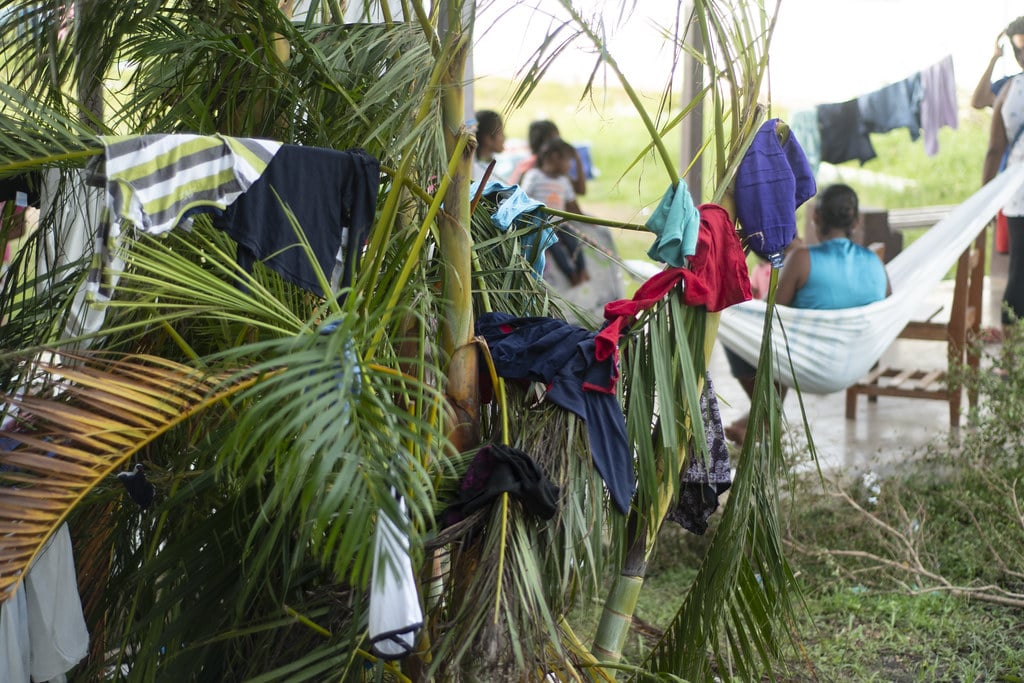27 de noviembre 2020

Children of Exile: The Births “Sowing Hope” in the Camp of Nicaraguan Farmers

PUBLICIDAD 1M
PUBLICIDAD 4D
PUBLICIDAD 5D
Government help isn’t reaching all of the shelters in Bilwi. With each passing day, the hunger and desperation mount.

Government help isn’t reaching all of the shelters in Bilwi. With each passing day
Every night since Hurricanes Eta and Iota hit, Taurina Chacon tries to sleep in order not to feel the hunger. She lives in Nicaragua’s North Caribbean and suffered the passage of Eta on November 3rd, and then Iota on November 16th. Since then, she’s gone hungry. Sometimes she does manage to sleep. Other nights, though, the whimpering of the children, shivering with cold, won’t let her sleep. Or she hears the elderly tossing and turning on the floor where they’re trying to get some rest.
Chacon says she’s feeling “desperate”. She was evacuated from the community of Wounta Bar just before Iota destroyed that coastal area on the northeast Caribbean. She was taken to the shelter located at the Bilwi campus of the Bluefields Indian and Caribbean University (BICU). “They just left us here, like it was nothing,” she says. In other shelters in Bilwi, “we heard they gave them mattresses. But they’ve just left us alone here, and we’re going hungry every day.”
More than 2,000 people were taken to shelter at this site. They affirm that they’re only receiving one meal a day, almost always just “white rice”. “We’re sleeping on the floor, and you can see that it’s dirty,” Jessenia Pictan points out. The regional authorities “don’t bring soap or bleach or anything to clean with. The children are sleeping on that floor with no mattress, nothing, so they’re getting sick,” she laments.
The diseases Pictan mentions are diarrhea, asthma, pneumonia, and fever. In the face of the authorities’ lack of aid, “we want to return to our communities. But we have nothing: there’s no house, there’s nowhere to sleep (…) We’re in the air, they’ve left us abandoned,” she asserts.

Shelter located at the site of the Bilwi campus of the “Bluefields Indian and Caribbean University”. Photo: Elmer Rivas / Confidencial
Every neighborhood in Bilwi has a church, school or private homes that served as a shelter during both hurricanes. All of these structures suffered damages from the winds of over 155 miles per hour. However, these are concrete buildings, and they remained upright. In contrast, the houses of the majority of the victims succumbed to the hurricane winds. Now these displaced people have nowhere to return to.
Maria Williams Clarens resided in the El Muelle neighborhood and lost her home during Eta, the first hurricane. She used the scant resources she had to reconstruct, “a little shack”. Then Hurricane Iota hit and left her with nothing. She’s staying at a Mormon church a few blocks from the beach. “But now they want to close the shelter, and I have six children. Where am I going to take them?” the woman asks.
With sadness, Williams has seen several of her neighbors benefitted by the government’s “Roofing Plan”. This is a program that distributes sheets of zinc for roofing. But “not even that” has been given her. The woman complains that those in charge of distributing the zinc have prioritized others. They help “those who are sleeping well, while they tell the one who doesn’t have anything, to wait.”
Virginia Morazan, who’s in that same shelter, emphasizes: “I’m left with the clothes I have on.” Since the day she evacuated on her own, she’s only received a bag of rice and a liter of cooking oil. She went to the offices of the National Port Company, the agency in charge of distribution for the “Roofing Plan”. But “they don’t want to help me. Now they say they’re not even going to give me zinc, because I’ve been talking to the media a lot,” she states.

Dozens of people remain in the shelter, located at the Bilwi campus of the Bluefields Indian and Caribbean University. Photo: Elmer Rivas / Confidencial
Morazan says that she and the other evacuees at the Mormon Church have gotten some help from private citizens. There are “people who come by in pick-up trucks. The women who have stores have sent us rice. And [we’ve had help] from the owner of the house, who lets us be here.” Since the hurricane passed, she says, her greatest worry is that she has “nowhere to go”.
In the BICU shelter, the residents of Wounta Bar long to return to their community. “We’re suffering here,” Jessenia Pictan says, “sleeping on the floor with just a cover.” “We need food, water, medicines. Clothing, dishes, stoves are needed because we’ve lost everything. We have nothing, we’re empty-handed,” the woman laments.
According to Vice President Rosario Murillo’s declarations, there were 1,365 evacuated families up through November 24. These families are all from the area of Waspan, Bilwi and Prinzapolka and were evacuated following the passing of Eta and Iota.
“There were 32,117 families in shelters at the beginning, and we’re there helping them (…) [We’re looking towards] the restoration of the first phase of normalization of our lives, at least, if it could even be called that.” These were the public declarations of Murillo.
Those like Chacon who are in the shelters have a different perspective. ”We’re already thinking of going back to the community. We know that we don’t have anything. The house is destroyed, the community is flooded. But it’s the same problem we have here, because they’ve left us tossed to the side. They’ve left us forgotten. So, we’re thinking about going back and living there like before,” the woman stated.

Photo: Elmer Rivas | Confidencial
Given the precarious conditions in the BICU shelter, a group of evacuees held a protest on November 23rd. The people in the shelters walked from the refuge to the site of the regional government. They did this to express their disapproval with the way the emergency aid was being handled. They demanded food and the zinc that the government is distributing.
In a video broadcast over a local channel, a citizen demanded: “They take a census, but when the time comes, the things get grabbed up. They don’t give them to the ones that were in the census. That’s not fair. I have a little girl and my house is destroyed. Come see if I’m lying – my daughter has come down with malaria, for the same reason.”
Vice President Murillo asserted that the government sent 270,000 zinc sheets to the zone affected by the hurricanes. According to her declarations, they’ve already sent 56,000 to the affected families. “We’ll continue the distribution all over the country, especially in the Caribbean and the mining triangle,” she said.
Archivado como:
PUBLICIDAD 3M
Confidencial es un diario digital nicaragüense, de formato multimedia, fundado por Carlos F. Chamorro en junio de 1996.
PUBLICIDAD 3D